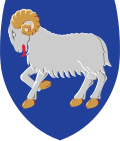 |
|---|

The Faroe Islands are an autonomous territory of the Kingdom of Denmark. Nationals of Nordic countries are free to enter, reside and work in the Faroe Islands, and nationals of other countries exempt from visas for short stays in the Schengen Area may also visit the Faroe Islands without a visa. [1] In addition, travel between the Faroe Islands and the Schengen Area is not subject to document checks. [2]
Contents
However, the Faroe Islands are not part of the European Union or the Schengen Area, so nationals of EU or Schengen countries, except for Nordic countries, do not have the right to reside in the Faroe Islands freely, and visas or resident permits issued for entering Schengen countries are not valid for travel to the Faroe Islands. [1] [3] [4] Specific visas for the Faroe Islands can be obtained in consular establishments of the Kingdom of Denmark, and their conditions are similar to those for Schengen visas. [1] [3] [4] Visas for the Faroe Islands are not valid for travel to the Schengen Area. [3] [4] Most people travelling to the Faroe Islands would transfer in Denmark or another Schengen country, for which they need a Schengen transit visa, because the flights or boat to the Faroe Islands count as inside Schengen. [1]
